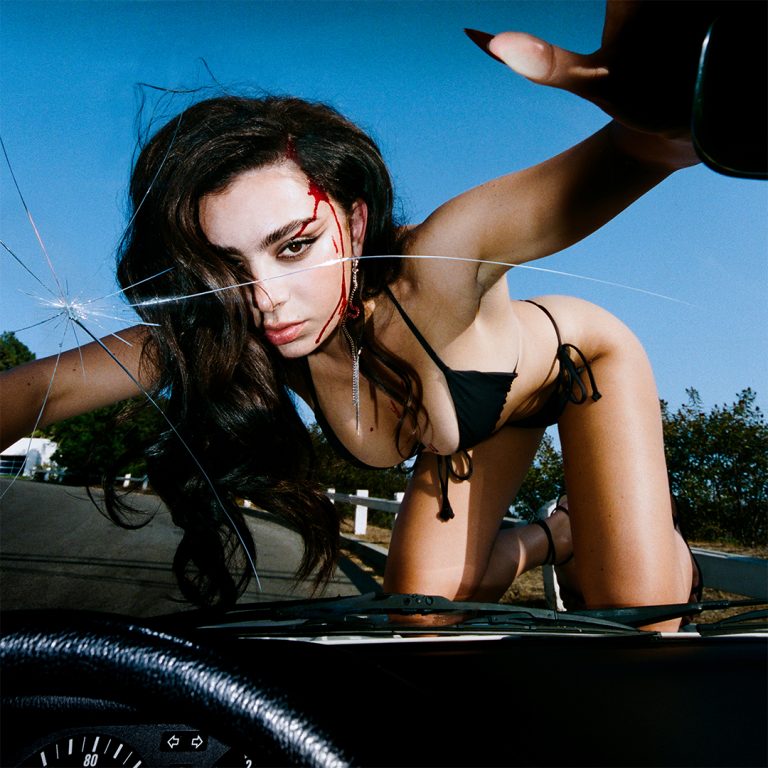There are two Hollywood films titled Crash. One is the tone-deaf Oscar-baiting by Paul Haggis that’s almost universally loathed today since it won Best Picture over Brokeback Mountain, a film that actually tackles bigotry in a meaningful way instead of pretending to. The other is a controversial 1996 psycho-erotic thriller by David Cronenberg where people – women specifically – are aroused by car crashes. Only one of these inspired Charli XCX’s fifth album, also titled Crash, and you can probably guess which from the cover art above (hint: it’s not the one with Matt Dillon playing a hyper-racist cop).
Of course, Crash isn’t literally about arousal from car crashes, Charli’s simply using it for aesthetic purposes in the promotion of the album to bring an edge to the femme fatale persona she’s adopted. As with every release, Charli’s stylistically pivoting on Crash, and with that comes a pile-up of complaints from her fanbase, a common occurrence in her career. This year, Charli’s online discourse has become problematic to some as she defends herself but also attacks fans. This controversy is nothing new for her though, her volatile fanbase teeters between lynch mobs and obsessive stalkers, with everyone in the middle of that spectrum just wanting good tunes.
And good tunes are all over Crash. Heralded by last year’s retrofitted banger “Good Ones”, Crash is unquestionably Charli’s most deliberate release since Pop 2. Everything here is radio ready and could easily be plucked for a greatest hits compilation – something that is both a pro and a con ultimately.
Before this, Charli used her albums and mixtapes duplicitously, making synth-pop but also pushing her more avant-garde proclivities. This resulted in enjoyable but imbalanced concepts, Charli never going all-in on one direction. It’s the first time she’s committed to one aesthetic, which is refreshing and consistent, though it does have its setbacks.
After the organic feel of how i’m feeling now in 2020, Crash feels like a makeover – a freeing collection of emotions that have been bottled up and shut inside for a few years. It’s all pouring out of her unfiltered and it flows furiously but haphazardly, and she’s brought in a team of talented collaborators to help guide it.
There’s the loaded “New Shapes” with Caroline Polachek and Christine and the Queens and the smashing “Beg For You” with Rina Sawayama, both of which harness the vocalists’ pop potentials but don’t go for the low-hanging fruit emotionally or melodically. Charli also shines when she’s by herself, especially on “Move Me”, which pulses with sexual desire.
There’s even more help behind the scenes. Long-time collaborator A.G. Cook emboldens the opening title track and then teams up with Oneohtrix Point Never on “Every Rule” which finds Daniel Lopatin continuing his streak of colorful embellishments found on his recent work with The Weeknd as well as his own Magic Oneohtrix Point Never. The striking 80s techno-pop sound of “Lightning” is one of Crash’s highest moments, with a thundering chorus thanks in part to producer Ariel Rechtshaid and a co-write with Rami Yacoub who has helped make some of the biggest hits for Britney Spears, Nicki Minaj, and even Weezer. All of these and more help up to make Crash her most blockbuster pop album yet, and she is totally comfortable on the biggest stage, always commanding even as she gets personal.
However, there’s a couple of head scratchers like the funky oddball “Yuck”, which finds her getting turned off by someone’s schmaltzy devotion. Meanwhile, “Baby” contains one of Charli’s simplest and moderately lackluster choruses that’s repeated ad nauseum, and while it’s reminiscent of “Next Level Charli” it’s overall a messy track with some spotty riffage.
Make no mistake though, Crash is a pop album with more than ample zeal, and Charli’s hitting a groove that feels natural to her. Despite its minor detours, Crash is one of Charli’s better albums even if it will likely garner a polarizing reaction. She’s fully dedicated though, and it’s a testament to her commitment to crafting the big ‘sellout’ pop album, which she mostly nails.

